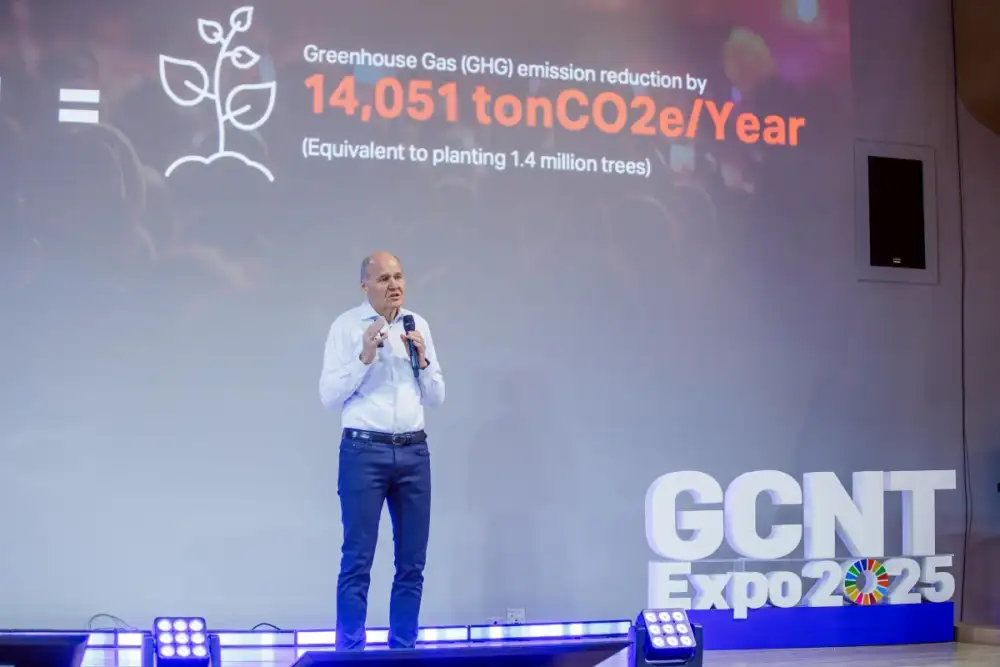
In an era of rapid technological change, accelerating like a perfect storm and evolving faster than ever in a global race, everything is becoming seamlessly connected. From industries and cities to the lives of everyday people, this connectivity is generating an unprecedented volume of data. By the end of this year, the world is projected to generate 181 zettabytes of data. To put that into perspective: one zettabyte can store the equivalent of 36 million years of HD video.
So the big question is: How do we turn this massive volume of data into a force for positive impact? At the GCNT Expo 2025, hosted by the Global Compact Network Thailand (GCNT), Sigve Brekke, Group CEO of True Corporation Plc, took the stage to share his perspective in a keynote session titled: "Data for Good: Greener Planet, Inclusive Society, and Stronger Governance." In his remarks, he outlined a path forward, where data and AI are used not just to advance technology, but to drive sustainable progress across all dimensions of ESG.
Data For a Greener Planet: Powering Smart Networks and Clean Energy
True Corporation continues to make steady progress in reducing both energy consumption and costs. Since the merger, the company has successfully reduced its energy usage by 9% and cut energy-related expenses by 19%. Looking ahead, True has set a target to enhance energy efficiency across its nationwide network within the next 3-5 years, through the adoption of renewable energy, infrastructure upgrades, and the deployment of AI-driven energy management at more than 10,000 base stations. In 2024, True's solar panel installations at network sites have helped reduce 14,051 tons of CO?emissions, equivalent to planting over 1.4 million trees. Beyond its own operations, True has partnered with CP Group to develop the Greenhouse Gas Emissions Data Platform, a solution designed to help supply chain partners measure, manage, and reduce their greenhouse gas emissions, as they work together toward achieving Net Zero.
Data for Good: Leveraging Mobility Data to Create New Tourism Supply and Revitalize Thailand's Travel Sector through "Cluster Tourism"
Mobility data can be a powerful tool in addressing national challenges. One notable example of cross-sector collaboration is the use of such data to help revive Thailand's sluggish tourism industry. Tourism once contributed 19% of Thailand's GDP in 2019, with over 40 million international arrivals. However, the global tourism landscape has shifted since the COVID-19 pandemic. While neighboring countries like Japan and Vietnam have seen robust recoveries growing 112% and 68% respectively. Thailand's tourism recovery stands at just 47%, still 12% below pre-COVID levels. Despite being a key economic driver, the tourism sector faces major challenges, from overtourism in major destinations to widening disparities in lesser-known secondary cities.
"Leveraging mobility data is a critical approach to revitalizing Thai tourism in a way that is more sustainable, inclusive, and equitable. Travel data provides deep insights into tourist behavior and reveals new travel patterns that can be further developed into emerging tourist destinations under the 'Cluster Tourism' strategy, encouraging overnight stays in secondary cities and driving more income distribution to local communities," said Mr. Sigve.
Analysis of anonymized mobility data, conducted under strict personal data protection policies, identified 21 high-potential cluster tourism routes that connect the unique identities of neighboring areas into new travel corridors. For example, in the Northern cluster of Chiang Mai, Lamphun, and Lampang, only 20% of visitors stay overnight in Lamphun and Lampang, despite the region's strong tourism potential. The data also reveals a valuable target segment: culturally inclined travelers aged 60 and above with high spending power. These insights have informed policy recommendations and targeted campaigns focused on wellness, golf, and cultural tourism, designed to attract overnight visitors to under-visited provinces and promote more equitable income distribution across local communities.
Data Meets Governance: Advancing Ethical AI through Strong Governance Principles
True Corporation reaffirms its strong commitment to good governance in the age of artificial intelligence, particularly in how data is used to train AI systems ethically and transparently. To date, True has developed over 62 AI use cases, all guided by four core pillars under its strict Responsible AI Guidelines:
Because in the end, this is not just about data or technology. It's about how we use data and AI to create meaningful change - to improve lives. This is the future True Corporation believes in. And it's the future we are building - for Thailand, for the planet, and for everyone.